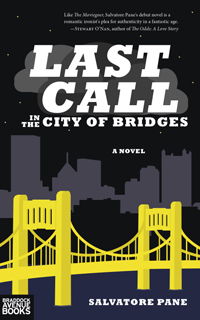 Last Call in the City of Bridges
Last Call in the City of Bridges
by Salvatore Pane
Braddock Avenue Books, November 2012
224 pages / $16 Buy from Braddock Avenue Books or Amazon
Remember the slog of the 2004 presidential campaign – the long months of desperate hope that we’d send Bush back to Texas and finally turn the corner? At the same time, of course, that hope was tempered by the reality of John Kerry – his awkwardness, his lack of passion, his John Kerryness. But still, it felt great to believe, even just a little: to believe that the election was about something bigger, something more important than just changing the White House china. For those of us who grew up in the 80s and 90s, it seemed like our generations (I hate the hair-splitting of Generation X, Generation Y, Millennials, Internet Generation, etc.) were dropped into a cultural void, searching for meaning in a century filled with greatness. Salvatore Pane’s debut novel, Last Call in the City of Bridges, is steeped in this feeling, in this desperate quest for generational identity. The book asks the same questions we’ve been asking ourselves for a decade or more: why is my generation here? What is here for us? How can we matter – and if we can’t, how can we at least get through this world alive?
The novel is bookended by the 2004 and 2008 elections. The false excitement and squashed hopes of Kerry. The thrill of watching our country leap forward, if only briefly, to elect Obama. More than any book I’ve read in years, this novel is grounded in a firm sense of its own place in history. In it, Pane writes of the importance of small events among uncertain times, of the longing for a larger myth – for something more to believe in:
This is a book about hopes and dreams, about waiting for a future that never comes, about the withering of traditional institutions like family and church, about instead turning to video games and superheroes for a moral compass. And so Pane has written not a book about pop culture, but rather a book about how pop culture has come to be our measure of human progress, and what that might mean – good and bad – for all of us. At a climactic point in the novel, the main character compares the collapse of his world to the switch from the Light World to the Dark World in The Legend of Zelda: A Link to the Past. He muses about the pointlessness of the old religions in the face of a new kind of myth-making: “no one who grew up in the age of Nintendo, no one who witnessed the rise of Facebook and Twitter could possibly believe in a magic book written under divine inspiration two thousand years ago.” At moments like this throughout the book, Pane expertly taps into the cultural zeitgeist of our time, into the brain of every kid who dreamed about Mario, Mega Man, and Wonder Boy. (Okay, maybe not Wonder Boy.)
There is a poignant beauty in the way humans connect, or fail to connect, in this book. Friendships and jobs and goals and communities fall apart. The “Odyssey Years” hold adulthood and contentment forever out of reach, while childhood memories fade away and lose their power to comfort. One of the main characters sits in front of a webcam counting until she reaches 250,000. A Facebook profile set up for a long-dead friend speaks to the need for immortality, if not of the soul then at least of the digital self. The chapter “The Son of God Complex” tells how Kanye West struggled with himself to become a superstar, and links to an earlier moment when Kanye appears to the remnants of the human race on Mars to cast down fire and brimstone. After a romantic encounter turns sour, Mega Man 2 provides comfort and solace:
I was sad to finish Last Call in the City of Bridges. It was a godsend, the kind of book I’m always hoping I find when I go to the bookstore. I had to read it in one sitting, pausing only to eat, sleep, and bring my cats to the vet. I had to know what happened next, what brought these characters together and what drove them apart. I wanted to know these characters in real life, to grab a beer with them and meet them for pancakes. At times I felt like I fell in love with them. Salvatore Pane’s writing is funny as hell, too. His use of pop culture factoids and video game or comic lore is controlled and masterful. This is the voice of a generation that knew the Konami Code by heart but never bothered learning the Gettysburg Address. This is a love letter to anyone who ever reached for an NES controller, dropped another quarter in the machine, or opened an old issue of Nintendo Power when life in the past was more livable than the present. This is a book that speaks for me.
***
Christopher Backley is an avid reader who lives in Washington, DC, with his wife (a writer) and two cats. He’s originally from Minnesota, where he first met his wife and developed a passion for indie lit.
Tags: Christopher Backley, Last Call in the City of Bridges, salvatore pane

I really like this review, Christopher Backley. Congrats to Sal.